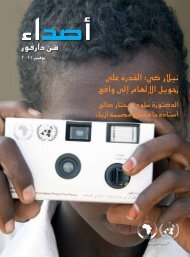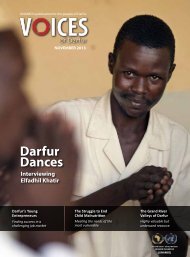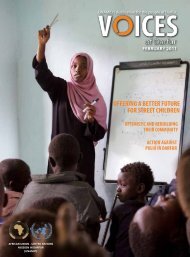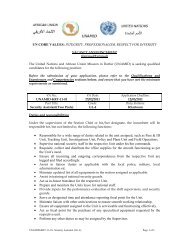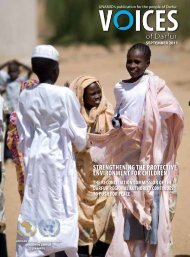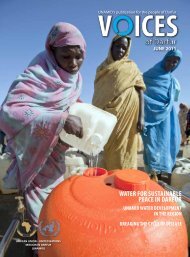THE POWER OF KNOWLEDGE
the power of knowledge - African Union - United Nations Mission in ...
the power of knowledge - African Union - United Nations Mission in ...
- No tags were found...
You also want an ePaper? Increase the reach of your titles
YUMPU automatically turns print PDFs into web optimized ePapers that Google loves.
WOMEN<br />
The power of knowledge<br />
Efforts to reduce illiteracy among women in<br />
IDP camps<br />
BY GUIOMAR PAU SOLE<br />
Could you imagine holding this magazine<br />
and seeing a jumbled set of letters, not<br />
able to understand a thing? And try to<br />
imagine not being able to write a note or<br />
sign a document?<br />
Learnt at an early age, reading and writing<br />
is just an everyday activity for most of the<br />
population. But not everyone has the same<br />
privilege. In Darfur, as in other developing<br />
regions, many women, especially the<br />
elderly in rural areas, suffer from illiteracy.<br />
Hopefully, the tide is now changing as<br />
everyday, more women discover how<br />
literacy can transform their lives.<br />
“I didn’t have the opportunity to go to<br />
school when I was young because I had<br />
to work at home and at the family farm,”<br />
says Khadija Abubakar Adam. The 35-yearold<br />
woman, originally from the village<br />
of Tawilla, North Darfur, now lives in the<br />
Abu Shouk camp for internally displaced<br />
persons (IDPs). The camp is near El Fasher<br />
and 45km far from her hometown. It is<br />
here where she has found the opportunity<br />
to make up for lost time, learning what she<br />
missed in her youth.<br />
A year and a half ago, Khadija started<br />
taking literacy lessons in the Abu Shouk<br />
Women’s Center. “I am very happy now,<br />
because if I find a written paper, I can<br />
understand it,” she explains. Hadija adds<br />
that she is also able to help her young<br />
children with their homework. Moreover,<br />
with her new knowledge she can read the<br />
Koran and some prayer books.<br />
The center was funded by the International<br />
Rescue Committee (IRC), one of thirteen<br />
International NGOs expelled from Darfur<br />
in March 2009. Now the facility is run by<br />
the Women’s Development Association<br />
Network, formed by more than 50<br />
women’s associations of North Darfur, with<br />
the collaboration of the UN Population<br />
Fund, UNDP and UNAMID, which funded<br />
the rehabilitation and several activities.<br />
Inside the center’s thatched classrooms,<br />
about 80 students learn Arabic,<br />
mathematics, Islamic studies and general<br />
culture from Sunday to Thursday, between<br />
noon and 4:00 pm. But not all is about<br />
studying in this special school: Tuesdays<br />
are dedicated to drinking tea and<br />
applying henna. “Not only the lessons are<br />
important. Women here forget about the<br />
problems they have outside,” explains the<br />
deputy director of the Women Network,<br />
Suad Abdela Mohamed.<br />
The students’ ages vary from their twenties<br />
to their sixties and some attend courses<br />
with their infants. “There is no age limit.<br />
10 VOICES <strong>OF</strong> DARFUR, JANUARY 2011



